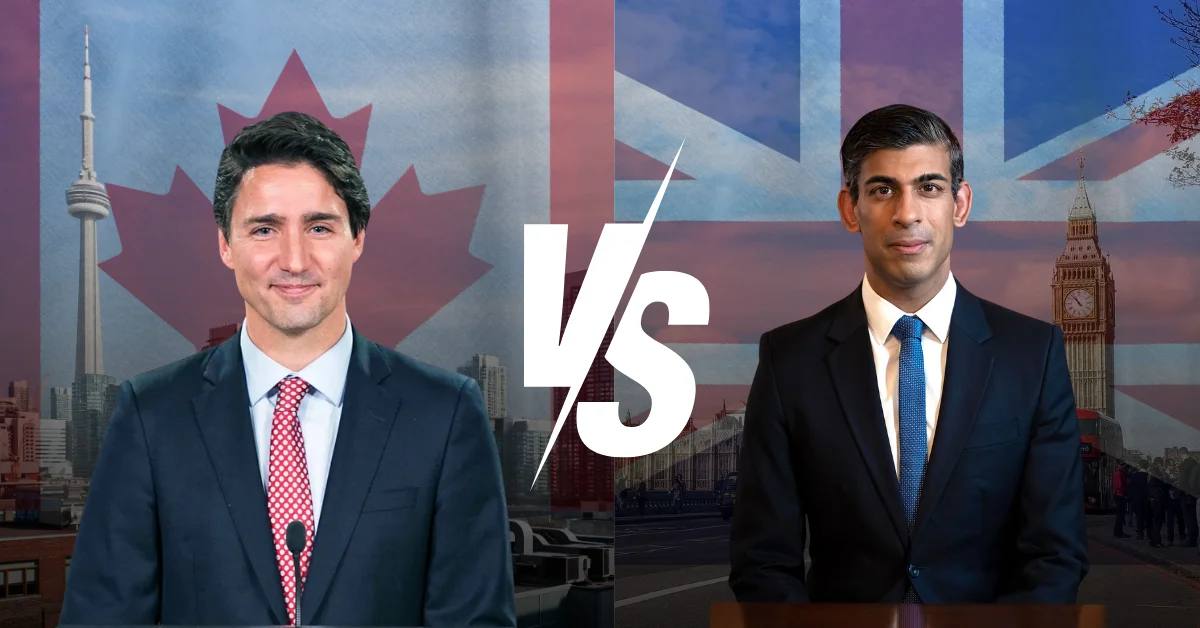Are you also lost in the “UK vs Canada” debate and overwhelmed by conflicting opinions and a list of endless pros and cons? Don’t worry, you are not alone. Every aspiring student is facing this challenge today.
Our blog is your go-to guide, with no big words or statements needing clarification. Whether you are into studying or working or want to explore the best options for yourself,
We will compare both countries based on their cost of living, job opportunities, universities, student visas, healthcare systems, and cultural differences. By the end of the blog, you will have your answer to the question, “UK vs Canada, which is better?”
UK vs Canada highlights
| UK | Canada | |
| Total international Students | 500,000 students have enrolled in the UK universities. | It is projected to host nearly 900,000 international students in 2023. |
| Top courses | Management, law, computer science, hospitality and psychology | Computer science, management, psychology, engineering, business and data analytics. |
| Course duration | Undergraduate courses: 3-4 years Postgraduate courses: 1-2 years | September/October- fall intake January/February- Spring intake |
| Intakes | September/October- fall intakeJanuary/February- Spring intake | September, January, and May |
UK vs Canada: A glimpse of two destinations
The UK:
- World-class education and academic facilities: The United Kingdom is home to some of the globe’s top-ranked universities, which are renowned for their academic brilliance, diverse programs, and groundbreaking research.
Earning a degree from the UK will help you to study and work anywhere in the world, as degrees from UK universities are widely recognised and respected globally.
- The diverse range of courses: Universities in the UK offer a wide range of programs that allow you to choose a study path that aligns with your interests and career goals.
- Language advantage: If you are a non-native English speaker, studying in the UK provides an immersive English language experience. It will enhance your language skills and provide a competitive advantage in the worldwide job market.
- Research opportunities: Studying in the UK will give you access to state-of-the-art facilities and allow you to engage in groundbreaking research.
- Internships and job opportunities: Many universities in the UK have strong connections with industries, providing you with opportunities for internships and job opportunities.
Global networking: You can create valuable connections with your professors and peers. It will open doors to future collaborations and career aspects.
Also Read: UK Study Visa For Indian Students 2024: Types, Requirements
Canada
- Education: Canada offers an affordable and high-quality education system. It also emphasises practical skills and research.
- Friendly and diverse: Canada offers international students a multicultural and welcoming atmosphere.
- Work opportunities: Canada provides various opportunities for international students. You can work during and after your studies. This not only helps to cover your living expenses but also offers valuable work experience.
- Language diversity: Canada is a bilingual nation with English and French as its official languages, providing an opportunity to enhance your language proficiency. This diversity contributes to your competitiveness in the global job market.
- Security and quality of life: Canada consistently ranks highly in global safety indexes. You can feel more secure in Canada with a high quality of life, excellent healthcare, and social services.
Also Read: Types Of Hotel Management Courses In Canada (2024)
UK’s prestigious universities vs Canada’s affordable universities
Deciding where to pursue your postgraduate studies is an important decision; when students discuss whether to select the UK or Canada for studying, it usually comes down to two main factors: the quality of the universities and the cost.
In the United Kingdom,
- Universities such as Oxford, Cambridge, and Imperial College London are famous. These establishments are well-known for their enduring commitment to academic excellence and research.
- Degrees from prestigious UK universities are highly recognised and respected globally. Graduates often find it easier to establish their international careers.
- The United Kingdom provides a vibrant cultural immersion with its historic cities, diverse communities, and a global perspective. You may benefit from exposure to a variety of cultures.
- Many undergraduate programs in the UK are three years, potentially saving time and money compared to four-year programs in some other countries.
Canada’s more affordable options
- In general, tuition fees in Canada are lower than those in the UK. This could considerably lower the total cost of tuition.
- After new reforms in Canadian policies, the cost of living in Canada is somewhere equal to the cost of living in the UK. The cost of living in Canada is 24,635 CAD. This includes expenses such as accommodation, food, and transportation.
Top Universities in the UK vs Canada
As we are doing UK vs Canada for Indian students, it is essential to mention some of the top universities in both countries and their QS rankings.
In the UK, there is a Russell group of 24 highly ranked public universities, many considered among the top universities in the country and the world.
Here is the list of 14 top universities in the UK:
| University | QS Rankings 2024 |
| University of Cambridge | #2 |
| University of Oxford | #3 |
| Imperial College London | #6 |
| University College London | #9 |
| University of Edinburgh | #15 |
| University of Manchester | #32 |
| King’s College London | #40 |
| London School of Economics and Political Science | #45 |
| University of Bristol | #55 |
| University of Warwick | #67 |
| University of Southampton | #=81 |
| University of Glasgow | #=76 |
| University of Leeds | #75 |
Top universities in Canada
Canada has three universities that are ranked in the top 100 universities:
| University | QS Rankings 2024 |
| University of Toronto | #21 |
| McGill university | #30 |
| University of British Columbia | #=34 |
Apart from the above universities, ten more Canadian universities rank among the top 300 universities worldwide.
| University | QS Ranking 2024 |
| University of Alberta | #111 |
| McMaster University | #=189 |
| University of Montreal | #=141 |
| University of Waterloo | #112 |
| University of Western Ontario | #114 |
| University of Calgary | #182 |
| Queen’s University | #209 |
| Dalhousie University | #298 |
| University of Ottawa | #=203 |
Top courses in the UK vs Canada
Here are some of the top courses offered by the UK and Canada for Indian students:
| The UK | Canada |
| Management | Computer Science |
| Law | Management |
| Computer Science | Psychology |
| Hospitality | Engineering |
| Psychology | Business and Data Analytics |
The UK also offers more courses, such as nursing, design studies, sports, exercise science, bioscience, health, and medicine.
Similarly, Canada offers more courses in agriculture science, bioscience, health, medicine, finance, geosciences, media and journalism, and human resources.
Duration of programs in the UK vs Canada
| Canada | The UK | |
| Doctoral or PhD | 2-5 years | – |
| Masters | 2 years | 1 year (2 years with placement/internship) |
| PG Diploma/ Graduate certificate | 1-2 years | – |
| Bachelors | 4 years | 3 years ( 4 years in Scotland) |
| UG Diploma | 2-3 years (the 2-year program is a Diploma, and the 3-year program is an advanced diploma | – |
| Bachelors with a sandwich year | – | 4 years ( 1 year of internship after completing the 2nd year) |
| Integrated masters | – | 4 years (5 years in Scotland) |
| Integrated masters with a sandwich year | – | 5 years (UG and PG combined with 1 year of internship) |
Admission requirements in UK vs Canada
Between the UK and Canada, which country will be the best option for Indian students that aligns with their goals? It also depends on the eligibility criteria you need to fulfil.
Canada
- The criteria for academic and English language proficiency are outlined as follows:
| Programs | Entry requirements | IELTS | TOEFL | PTE |
| Masters | 16 Years of full-time education65% and above in Bachelors | 6.5 with no band less than 6.0 | 88 | 62 |
| PG Diplomas | 15 Years of full-time education50-55% and above in Bachelors | 6.5 with no band less than 6.0 | 88 | 62 |
| Bachelors | 12 Years of full-time education60% and above in grade 12 | 6.5 with no band less than 6.0 | 79 | 62 |
| UG Diplomas | 12 Years of full-time education50-55% and above in grade 12 | 6.0 with no band less than 6.0 | 79 | 58 |
- A well-updated resume or CV.
- Letter of recommendation.
- Proof of funds
The UK
- You must have completed 10+2 from a recognised education board.
- For an Engineering degree, a score of 60% – 85% in Mathematics and Physics in 12th Standard, depending on the university, is required.
- Business degree programs at various universities may necessitate a mathematics score ranging from 55% to 85% in the 12th standard, depending on the university’s requirements and other relevant subjects. Some exceptions exist, where the mathematics score in the 10th standard may be considered.
- You should have an IELTS score of 6.0/6.5, no band less than 5.5, depending on the course and the university.
- Other criteria:
| Type Of University | Entry Requirements |
| High Ranked Universities | 80%+ in 12th standard |
| Middle Ranked Universities | 60%-70% in 12th standard |
| Low Ranked Universities | 60%+ in 12th standard |
- Your academic mark sheet (10th & 12th)
- 2 Letters of recommendation from your school
- Passport
- IELTS Score (if required)
- Statement of purpose
- Resume
UK vs Canada cost of living
The living expenses in the UK and Canada may differ based on location, lifestyle, and personal spending habits. Here’s a general overview:
The UK
| Particulars | Amount in GBP(€) | Amount in Rs. |
| Exam fees (IELTS General/Academic) | 16,250 | |
| Tuition Fees | 14,000 | 14,00,000 |
| Living cost | 9,600 | 9,60,000 |
| Visa Fees | 490 | 44,869 |
| NHS Health Surcharge(€470 per year + €235) | 705 | 70,500 |
| Total | 2491619 | |
| Less part-time earnings | 6,000 | 6,00,000 |
| Net cost | 18,91,619 | |
| Scholarships | Yes | |
| Nature of part-time jobs | Off-campus 20 hrs. Per week. During vacation, 40 hrs. per week |
The Canada
Total cost for 1-year diploma program:
| Particulars | Amount in CAD | Amount in Rs. |
| IELTS exam fee | 16,250 | |
| Tuition fees for one year (Actual tuition fees may vary) | 15,000 | 9,00,000 |
| Living and Accommodation | 10,200 | 6,12,200 |
| Airfare from India to Canada | 55,000 | |
| Visa fees (including biometric fees) | 235 | 14,100 |
| Total expenses | 15,97,350 | |
| Less earning through part-time jobs | 11,500 | 6,90,000 |
| Total expenses for study in Canada | 9,07,350 | |
| Total expenses (Round off) | 9,00,000 |
Total cost for 1-year degree program:
| Particulars | Amount in CAD | Amount in Rs. |
| IELTS exam fee | 16,250 | |
| Tuition fees for one year (Actual tuition fees may vary) | 20,000 | 12,00,000 |
| Living and Accommodation | 10,200 | 6,12,200 |
| Airfare from India to Canada | 55,000 | |
| Visa fees (including biometric fees) | 235 | 14,100 |
| Total expenses | 18,97,350 | |
| Less earning through part-time jobs | 11,500 | 6,90,000 |
| Total expenses for study in Canada | 12,07,350 | |
| Total expenses (Round off) | 12,00,000 |
Job markets: UK vs Canada

Choosing between the UK and Canada for your career can be challenging, especially because both countries have dynamic job markets.
Here is the overview:
Employment rates, industries, and growth rates
Employment rates:
- The UK’s employment rate is currently 75.5%, one of the highest in Europe. Lower unemployment can help people compete.
- In Canada, the employment rate is at 60.4% but is consistently strong and shows a positive upward trend.
Key industries
- The UK: Finance, technology, professional services, creative industries, manufacturing, and healthcare.
- Canada: Natural resources, energy, technology, healthcare, tourism, agriculture.
Growth sectors
- Technological innovation, healthcare, e-commerce, and data analytics are booming in both countries.
Student visa in the UK vs Canada:
You must have a student visa to begin your education in the UK or Canada. You should look at the study visa procedure of both countries. Here is the overview:
The UK study visa

The UK generally offers three types of study visas: short-term study visas, student visas (Tier 4-General), and child student visas.
Short-term study visa:
This visa is for students who want to study a short-term course, such as an English language course, in the UK for no more than 11 months.
- In the case of this visa, there is no condition outside the UK or inside the UK; the final cost you have to pay in Indian rupees is 200 GBP (Rs 17500 approx).
- You will also have to pay a healthcare surcharge fee of 470 GBP (approximately Rs 41300) as part of your application. This fee allows you to access the United Kingdom’s National Health Service (NHS).
- You must be 16 years old or older.
- You must have been accepted into an English language course that lasts at least six months and no longer than 11 months.
Student Visa (Tier-4 General):
You can apply for this visa if you are 18 or older. The visa fee in Indian rupees will be 490 GBP (Rs 43,018 approx.)
- You must have been offered a place on a full-time course at a recognised UK university or college.
- You have sufficient financial resources to support yourself and pay for your chosen course- the amount will vary depending on the circumstances.
- You can communicate effectively in spoken and written English. You can take IELTS, PTE, or TOEFL to prove your English language.
- You are 18 years old or older, and the most important thing is that you have your parent’s consent, as you must provide it as evidence while applying for your student visa.
Child Student Visa:
Application for this visa is open to you if you are between 4 and 17 years old and want to study at a recognised school in the UK.
- If you apply for your child’s student visa outside the UK, the fee is 490 GBP (Rs 43,018 approx.).
- If you want to extend or switch your student visa from inside the UK, the fee in Indian rupees will be 490 GBP (Rs 49,485 approx.).
- “You will also have to pay a healthcare surcharge fee as part of your application. The amount will depend on how long your visa will last.”
- You must be between 4 and 17 years old and want to study at a recognised school in the UK.
- You have an unconditional offer of a place or course at a recognised school in the UK.
- Most importantly, you must have your parent’s or guardian’s consent to study in the UK, as you have to attach it with your documents while applying for a UK Study Visa.
Canada
You require a study permit in Canada to enter and study at designated learning institutions (DLI). Remember that your study permit is not your visa; if Canadian authorities approve your visa, your visa will be issued along with your study permit.
What is a Canada study permit?

A study permit is an official authorisation enabling international students to pursue studies at designated learning institutions (DLIs) in Canada.
While it is distinct from a visa, it’s important to note that additional requirements, such as A visitor visa or an electronic travel authorization (eTA)., may be necessary to enter Canada.
Who needs a study permit?
A study permit is required for most international students planning to study in Canada for more than six months. However, there are exceptions, including exchange programs and specific short-term courses.
Canada study visa eligibility requirements
To be eligible for a Canada study permit, you must:
- Be enrolled at designated learning institutions (DLI)
- Prove you have enough money to pay your tuition fees and living expenses.
- Obey the law and make sure you do not have any criminal record (and get a police certificate if required).
- Maintain your health and get a medical exam.
- Demonstrate to an immigration officer that you have plans to depart from Canada. once your study permit expires.
Document required for Canada study permit
- Proof of acceptance: Your school will provide you with a letter of acceptance (LOA). Include an original or an electronic copy of your letter with your application.
Conditional acceptance and prerequisite courses:
If you have been conditionally accepted, you must take prerequisite courses, such as English or French as a second language.
Completing these courses is a requirement before you can commence your main study program.
In this case, authorities will issue your study permit for the duration of those courses plus one year. Once you gain acceptance into your primary program, you can apply for a fresh student permit to prolong your duration as a student.
Exceptions:
Suppose you are a family member of an individual who received written approval for a study permit or work permit application before arriving in Canada. In that case, you are not required to have a letter of acceptance.
- It would be best if you verified your identity, so you should submit a passport or travel document and two recent passport-sized photographs.
- Proof of financial support:
You can prove your funds by
- Documentation of a Canadian bank account under your name, particularly if you’ve transferred funds to Canada.
- A Guaranteed Investment Certificate (GIC) issued by a participating Canadian financial institution.
- Verification of a student or education loan from a bank.
- Bank statements covering the last four months.
- A bank draft that is convertible to Canadian dollars.
- Evidence of payment for tuition and housing fees.
- A letter from the individual or institution providing you with financial support.
- Confirmation of funding received from within Canada, applicable if you hold a scholarship or are enrolled in a Canadian-funded educational program.
- Explanation Letter: This document aids the visa officer in comprehending your background and objectives. This letter explains:
- Why do you want to study in Canada?
- Do you understand your responsibilities as a student or not
- Quebec Acceptance Certificate: To study in Quebec for a period exceeding six months, you must obtain an attestation of issuance for your Quebec Acceptance Certificate (CAQ) from the Government of Quebec. Your educational institution can guide you through applying for the CAQ.
- Health Examination: If you find yourself in any of these scenarios, a medical examination may be necessary:
- You plan to study in Canada for over six months.
- You recently spent time with countries.
- You plan to work in specific jobs where public health must be protected.
- A custodian declaration (minors only), or
- Other documents
Canada study permit fee
- The cost of a Canadian study permit (including extensions)- per person is 150 CAD.
- If you want to restore your status as a student, you have to pay a fee of 379 CAD. (Restore your status for 229 CAD and get a new study permit for 150 CAD)
Conclusion
In conclusion, for Indian students, the choice between studying in the UK vs. Canada hinges on individual priorities. There’s no one-size-fits-all answer, as both countries offer distinct advantages.
Consider your values, career goals, and lifestyle preferences when deciding. The UK offers prestigious universities and a rich cultural experience, while Canada is known for affordability and a welcoming environment.
For further insights, explore university websites and official government pages. Research admission requirements, cost of living, and job opportunities in your chosen field.
Ultimately, both countries provide unique opportunities, whether it’s the UK’s historic charm or Canada’s welcoming atmosphere. It’s about finding the right fit for your journey.





























5 Responses
Thank you for your sharing. I am worried that I lack creative ideas. It is your article that makes me full of hope. Thank you. But, I have a question, can you help me?
Your point of view caught my eye and was very interesting. Thanks. I have a question for you.
Thank you for your sharing. I am worried that I lack creative ideas. It is your article that makes me full of hope. Thank you. But, I have a question, can you help me?
Thank you for your sharing. I am worried that I lack creative ideas. It is your article that makes me full of hope. Thank you. But, I have a question, can you help me?
Can you be more specific about the content of your article? After reading it, I still have some doubts. Hope you can help me.